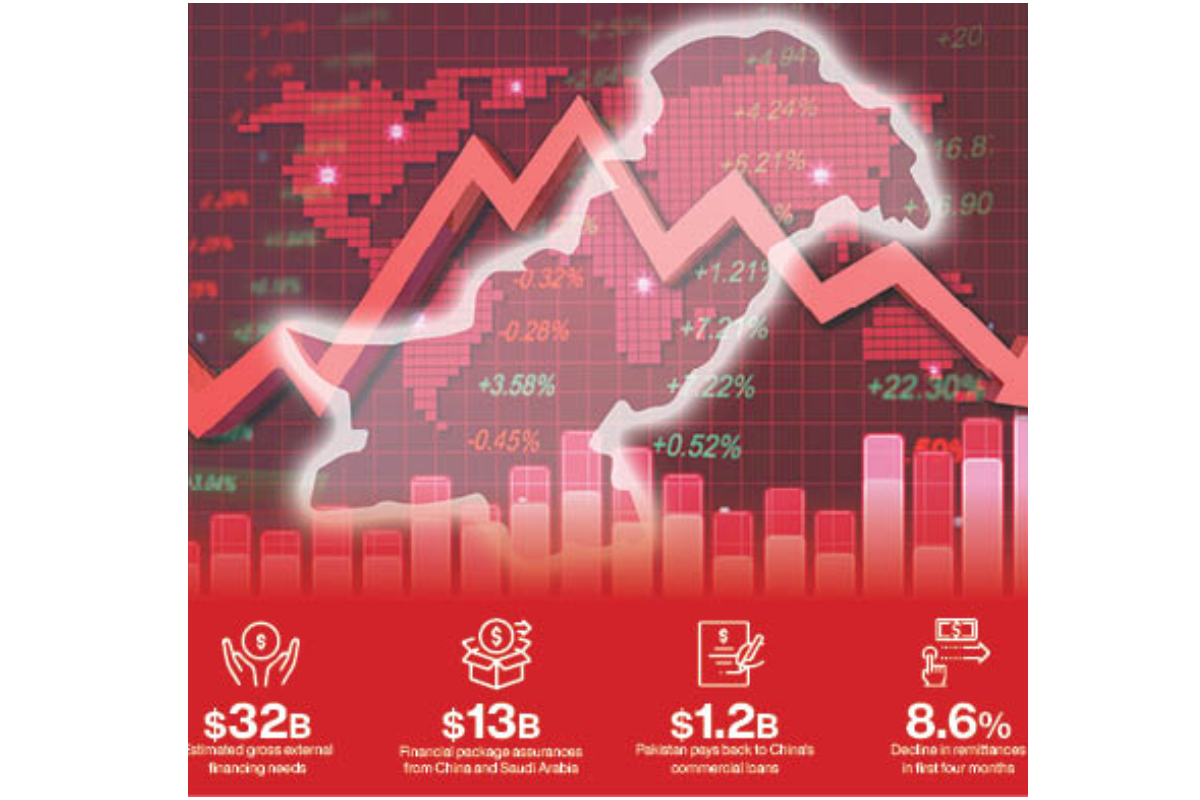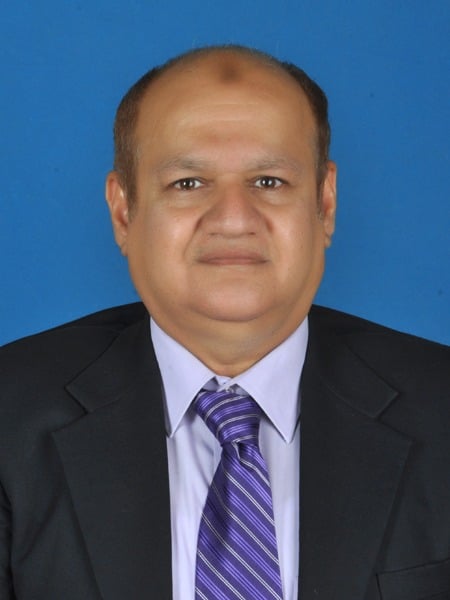
Debt and Default
The populist approach may shut few options left to keep economy afloat
ISLAMABAD: At a time, when the country is on the verge of default, Finance Minister Ishaq Dar vows to take no dictation from the International Monetary Fund (IMF) and even claims to address the balance of payments crisis without its help.
Economists believed that the Dar’s populist stance is suicidal and it may shut a few options left to save the economy from a default.
Since taking over the charge as the finance minister, Dar repeatedly said that the government could meet its financial obligations easily, adding that it was not necessarily to meet all the IMF demands.
Experts and analysts said the country’s financial crunch is deeper than Dar’s comprehension. He had left the country in crisis twice and he would do it again with impunity.
During the first week of November, the finance minister boasted that Pakistan received assurances of a $13 billion financial package — $4.2 billion from Saudi Arabia and $8.8 billion from China. The package also included $5.7 billion in fresh loans.
But Dar’s claims remained far-fetched dreams, no foreign aid reached at the national exchequer, instead Pakistan had to pay back two Chinese commercial loans of $1.2 billion.
The promised $13 billion package is equal to 38 per cent of the estimated gross external financing requirements of the country for the fiscal year 2022/23, which is over $32 billion.
However, what was really surprising is that Dar claimed that these assurances were given to Prime Minister Shehbaz Sharif during his visits to China and Saudi Arabia but the handouts released by the PM Secretariat mentioned none of these commitments.
The much-anticipated visit of Saudi Crown Prince Mohammed Bin Salman to invest $10 billion has also been cancelled, whereas the foreign exchange reserves held by the State Bank of Pakistan (SBP) plunged $784 million to a nearly four-year low of $6.72 billion and the dollar reached a level of Rs224, which is much higher from the value of Rs200, which was projected by the finance minister.
Amid undeclared restrictions, the importers of essential items — edible oil, pulses, fruits and vegetables — are facing difficulties in opening the letters of credit (LCs), due to the dollar’s shortage in the interbank and open markets.
The banks are blatantly charging a premium of Rs10 to Rs15 from the importers. Even in the open market, despite having the dollar rate of Rs232, the greenback is not available and one has to buy it from the black market at over Rs260. Because of the unrealistic exchange rate, the overseas Pakistanis are now sending foreign exchange through illegal channels of hawala and hundi, which resulted in 8.6 per cent decline in the remittances through the banking network in the first four months, whereas in October, it declined 15.7 per cent on a year-on-year basis.
Unmoved from severe criticism by leading economists and the opposition, Dar still claims that the country will meet all its debt obligations of around $32 billion.
In an interview to a private television channel, Dar said that the World Bank’s subsidiary South Asia Regional Integration, Cooperation and Engagement (SA RICE) will provide $450 million and the Asian Development Bank will also provide a matching grant for the same project. Besides, the World Bank will also give $800 million for three different projects, he said, adding that the government is now expecting that the current account deficit will remain in the range of $8 billion against the projection of $11 to $12 billion.
Regarding a delay in the ninth review of the IMF, which was scheduled in October, he said: “I do not care if the IMF people will not come. We are not desperate for their $500 million, which they release after the conclusion of this review. If they do not, we will manage it easily.”
According to Dar, the government has almost met all the fiscal targets of the IMF and admitted that the target of petroleum development levy of Rs850 billion might not be met but the shortfall will be nominal and it will be met by the State Bank of Pakistan’s (SBP) additional profit of Rs70 billion.
The IMF should also understand that the financing projection for the rehabilitation and reconstruction of the flood-affected areas for the next five years is not possible, he added.
Even Dar hit back at former finance minister and his party member Miftah Ismail and alleged that he (Miftah) remained unable to arrange a single loan during his stint as the finance minister. However, Dar deliberately avoided mentioning that much of the loans received by the government were already multilateral and bilateral donors when Miftah held the office.
However, Esther Perez Ruiz, IMF’s resident representative in Pakistan, in a written reply to the media, negates the finance minister’s stance.
“The discussions with the Pakistani authorities in these areas are ongoing, especially as not all end-September quantitative targets have been met,” he added.
“Significant new developments have taken place since the last review, including the extraordinary floods and a number of new measures and developments, which affect this year’s economic outlook,” Ruiz noted.
Official sources said the IMF has informed the Finance Ministry that the fund required completion of all end-quarter performance criteria and targets.
“Both sides would also require broader agreement on forward-looking data on the basis of which the performance targets and indicative targets for the remaining programme period till June 2023 will be set,” they added.
In the aftermath of severe floods, all macroeconomic and fiscal frameworks were adjusted altogether so both sides would have to strike a consensus on the revised macroeconomic framework.
The broader agreement on the revised macroeconomic framework could pave the way to evolve consensus on a staff-level agreement for the completion of the ninth review under the $7 billion Extended Fund Facility.
With the revised figures of nominal growth in the range of 25 per cent, the tax-to-GDP ratio was bound to decline if the Federal Board of Revenue (FBR) achieved its annual target of Rs7.47 trillion for the current fiscal year. Without an agreement on the revised figures, it would be difficult for striking an agreement between the two sides.
The Pakistani authorities are still hopeful that the ninth review would soon be accomplished, paving the way for the release of the next tranche of around $1 billion for the country’s struggling economy.
However, at a time when the default is looming large on the country, the Ministry of Planning has moved a summary to the prime minister for protecting the allocated amount of Rs727 billion for the development outlay to spur growth. But what was really shocking is that now the government has approved the authorisation of jacked up Rs87 billion allocations for the Sustainable Development Goals (SDGs) Achievement Programme executed through the parliamentarians for the current fiscal year.
Initially, the allocation of the controversial SDGs Achievement Programme was jacked up from Rs68 billion to Rs82 billion, which was further increased to Rs87 billion.
Senior economist Dr Ikramul Haq, while commenting on the SDGs, said that the IMF will not tolerate this kind of lavish spending and it will be an uphill task for the government to justify this spending.
Senior economist and Sustainable Development Policy Institute (SDPI) Deputy Executive Director Dr Sajid Amin Javed said that the government should understand that the IMF programme is the lifeline for the country to save it from a default.
“It is a credit or bank guarantee through which we approach the donor agencies and other countries for the multilateral and bilateral loans.”
For him, the government should avoid discussion on the IMF programme in public because any irresponsible statement can derail it or may add further harsh conditions by the multilateral agency, which will be disastrous for the country.
“No multilateral agency or even friendly countries such as China or Saudi Arabia will lend us money if we get out of the IMF programme,” he observed.
According to Javed, the completion of the ninth review is very critical because it will subside the perception of a default.
However, the possibility of a default is very minimal because much of the bilateral debt of the country comes from China, Saudi Arabia or the US and these countries will not let it happen.
In 2023, no commercial payment has to be made and this will provide a breather to the government to some extent, he added.
Former spokesman for the Pakistan Tehreek-e-Insaf (PTI) and senior economist Muzzamil Aslam said that the finance minister, on the one hand, is showing tantrums to the IMF, and on the other, he is meeting the ambassadors of the US, the UK, China, Saudi Arabia and the UAE and requesting them to convince the IMF to show leniency and sympathy towards Pakistan.
“In the last eight to nine days, the finance minister is only meeting the foreign diplomats and seeking financial assistance or relaxation in the IMF programme,” he added.
For Muzzamil, the lack of political will to take timely decisions landed the government in hot waters.
Now in desperation, Pakistan has requested Saudi Arabia to immediately provide $3 billion in cash after its foreign exchange reserves fell to a critically low level, as the new army chief was also expected to play a role in bagging the bailout during his upcoming maiden visit to the kingdom.
Finance Minister Dar made the request during a meeting with Saudi Ambassador Nawaf bin Said Al-Malki, according to the ministry officials.
It was the second consecutive day when the finance minister held meetings with the foreign diplomats in his efforts to seek their financial support and also influence the IMF to soften its stance on releasing its $1.2 billion tranche to the country.
Dar’s request for the cash bailout of $3 billion was over and above the same amount of money rollover of the previous debt.
The $6.7 billion foreign exchange reserves are not enough to service the $8.8 billion principal and interest payments during the January-March period of the current fiscal year, sources said.
A Finance Ministry’s statement said that Dar thanked the Saudi ambassador for extending the term of a $3 billion deposit with the SBP by the Saudi Fund for Development.
According to the sources, during the meeting, it was also discussed that Chief of the Army Staff (COAS) General Syed Asim Munir would soon visit the kingdom and take up the cash injection issue.
Catch all the Economic Pulse News, Breaking News Event and Latest News Updates on The BOL News
Download The BOL News App to get the Daily News Update & Live News.








 Read the complete story text.
Read the complete story text. Listen to audio of the story.
Listen to audio of the story.